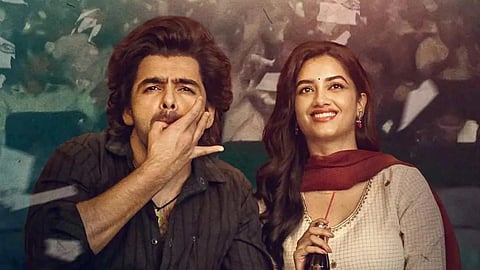Andhra King Taluka Movie Review: A heartfelt and powerful tale about heroism
Andhra King Taluka(3.5 / 5)
Andhra King Taluka is the story of Sagar, a young boy whose life begins and ends with his love for a big movie star, Surya (Upendra). The film, however, doesn’t begin from his perspective. We are made to wait plenty until Sagar’s arrival. And even when Sagar's euphoric mass intro scene arrives, it ends in an almost anti-climactic way. We see Sagar stumble through petty fanwar rivalry before we get a sense of who he actually is. Interestingly, filmmaker Mahesh Babu P arrives at this crucial juncture in an unconventional yet impactful manner. It’s a flashback within a flashback, but the writer-director is clear in his goal with Andhra King Taluka — this is an extraordinary tale of an ordinary-looking boy—and the filmmaker doesn’t shy away from melodrama to drive the point home.
Director: Mahesh Babu P
Cast: Ram Pothineni, Bhagyashri Borse, Upendra, Rahul Ramakrishna, Murali Sharma
Amidst the use of familiar tropes, there is also an impressive self-assuredness to the filmmaking. The early portions might prepare you for a generic melodrama (especially with its relentless background score), but Mahesh Babu P defies many conventions known to mainstream Telugu cinema. There is a genuine attempt at world-building here. For instance, the Godalli Lanka village in this film might look like a familiar space, but it has its own history and baggage, which is a small detail that wraps up beautifully as the story progresses towards a monumental end. There are multiple jumps in the narrative, going from present to past back to present again, but the transitions are impressively smooth. The director also finds a subtle way to address the ideas of class barriers and their power struggles through the idea of an influential theatre owner who looks down upon the very audience whose patronage he feeds on. There is another interesting dynamic between Sagar and Eeshvar (Rahul Ramakrishna), whose arc begins as a staple hero’s friend figure but who gradually ends up as a rival to Sagar in his own way. The writer-director treats this subplot with respect and uses it to elevate the drama (besides extracting a brilliant visual staged on a sunlit Godavari river).
The romance between Sagar and Mahalakshmi (Bhagyashri Borse) too is refreshingly sweet and breezy, bringing a smile to your face. When Mahalakshmi slyly lets Sagar know that she knows about his feelings for her, Sagar doesn’t respond with swagger or jubilance. At heart, he is still a coy loverboy.
And yet underneath all its attempts to do something different, it’s the old-school sentimentality of the storytelling that wins you over. When I first noticed a runtime of 2 hours and 46 minutes, I felt a little skeptical. But, it makes sense. For the sentimentality to land effectively in the second half, the narrative needed that kind of breathing space, and Mahesh Babu has the conviction and clarity to prioritise that over frantic pacing.
The film is not without its share of shortcomings. For instance, one wished that the film made space for Sagar’s dynamics with other members of the fan club he presides over. And yet, you find yourself slowly immersed in Sagar’s naive leadership struggles.
After Kaantha, Bhagyashri Borse again proves that she is the next big thing for the Telugu film industry. She has a resplendent screen presence and brings a distinct charm to Mahalakshmi. Upendra brings an endearing earnestness to his extended cameo, lending the film so much gravitas. But of course, this film belongs to Ram Pothineni, who carries the film on his shoulders, bringing incredible warmth to his portrayal of Sagar, a wide-eyed boy who learns to come of age in the most unassuming of ways.
The songs and background score by Vivek-Mervin too are in great sync with the narrative’s mood. It’s only fitting that Mahesh Babu P makes space for an old-school dream song sequence — with ‘Chinni Gundelo’ that actually captures the fantastical dreams of its rooted protagonists. Andhra King Taluka is nothing if not a film about the power of fantasies and storytelling. Of course, the film could have been a lot more had it decided to delve into the politics and perils of parasocial relationships between a fan and its fandom, a subject particularly relevant for the Telugu industry, where any big film almost always depends on a star’s loyal fanbase.
But this is specifically a story about Sagar, only one of those countless fans, and it isn't necessarily an accurate representation of the collective fandom. The film talks not as much about fandom or the allures of stars and their hold on an average wide-eyed filmgoer; it’s more personal. It’s about finding one’s best version through an external force that has nothing to do with their lives. While we are familiar with the idea of film stars being treated as demi-gods, in Sagar’s case, it makes perfect sense. Before he could find the hero within himself — a virtue great enough to inspire his own idol — Sagar has his moments of darkness and doubt. It was a cassette tape and a few lines of dialogue that gave him courage to fight through life and every obstacle that comes his way.
Anyone who has ever found strength and solace in stories and art, this film will hit them like the blinding her comforting light from an old-school theatre projector. After all, Andhra King Taluka is about the power of cinema itself.

